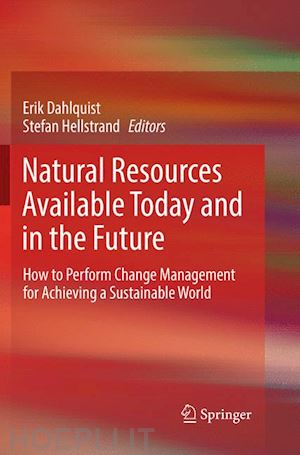
Questo prodotto usufruisce delle SPEDIZIONI GRATIS
selezionando l'opzione Corriere Veloce in fase di ordine.
Pagabile anche con Carta della cultura giovani e del merito, 18App Bonus Cultura e Carta del Docente
This book focuses on providing an overview of all our available natural resources, considering the sustainability and potential for power generation of each. Energy efficiency prospects of each natural resource are examined in the context of society’s key energy needs- Heating/cooling, Electric Power, Transportation and Industrial Production. Geography, climate and demographics are all discussed as key vectors impacting the comparative opportunities for self-sustenance around the globe. The authors provide in-depth coverage of renewable energy upscale and energy efficiency improvements in industry and society within a historical context, including a keen look at the variable effectiveness of different policy tools that have been used to support the transition away from unsustainable resource use. Finally, suggestions for more sustainable futures are provided, from improved policy measures, to new technological horizons in areas from offshore wind and marine energy to biogas and energy storage.
System Perspective.- The challenges of measuring sustainability performance.- Population development, demography and historical perspective.- Biologic resources.- Energy resources and regional balances.- Nonorganic and fossil resources. Known and estimated resources.- Reuse and circulation of organic resources and mixed residues.- Energy, different forms.- Impact on climate and environment.- Policies and incentives - Natural resources available today and in the future: how to perform change management for achieving a sustainable world.- Is Circular economy a magic bullet?.
Dr. Erik Dahlquist is Professor of Energy Technology and Research Director of the School of Business, Society & Engineering at Mälardalen University in Sweden. He has been Dean of the Department of Natural Science and Technology at Mälardalen since 2004. Dr. Dahlquist also worked for twenty years in the power industry, holding a number of research and management positions with ABB/Alstom Grid. Dr. Dahlquist’s current research foci include Process Development for Renewable and Sustainable Energy Products, Energy and Efficient Power Load Management for Grids and Buildings and Environmental Management.
Dr. Stefan Hellstrand is PhD Energy and environmental engineering, PhLic Systems ecology - Natural resource management and MSc Agriculture - Animal husbandry. He has during more than three decades combined academic work with advanced consultancy. Reality itself has been utilised as a laboratory of reality, to which specific questions is asked, where the answers express the relevance and robustness of the academic work. Simultaneously customers are introduced to knowledge at the scientific frontier or ahead of it, where they decide by themselves whether it is for the benefit of their organisation to take the chance and risk to utilise it. This represents a process for methodological development where the commercial market is used as a prober in the academic work, at the same time as short- and long-term objectives of customers are fulfilled. Through this process a tool-kit supporting a sustainable development have emerged, that when applied in reality has contributed to sustainable intensification, supporting 14 of 16 environmental quality objectives in Sweden, several of the eight Millennium Development Goals, and with the capacity to support the 17 UN Sustainable Development Goals. Through these tools causal chains can be followed in systems characterised by mutual dependencies between systems and systems levels, thresholds, irreversibilities; i.e. the complexity of life as a defining systems characteristics. This integrates agricultural sciences, system ecology, economic theory, applied environmental sciences, life-cycle assessment and integrative assessment.











Il sito utilizza cookie ed altri strumenti di tracciamento che raccolgono informazioni dal dispositivo dell’utente. Oltre ai cookie tecnici ed analitici aggregati, strettamente necessari per il funzionamento di questo sito web, previo consenso dell’utente possono essere installati cookie di profilazione e marketing e cookie dei social media. Cliccando su “Accetto tutti i cookie” saranno attivate tutte le categorie di cookie. Per accettare solo deterninate categorie di cookie, cliccare invece su “Impostazioni cookie”. Chiudendo il banner o continuando a navigare saranno installati solo cookie tecnici. Per maggiori dettagli, consultare la Cookie Policy.